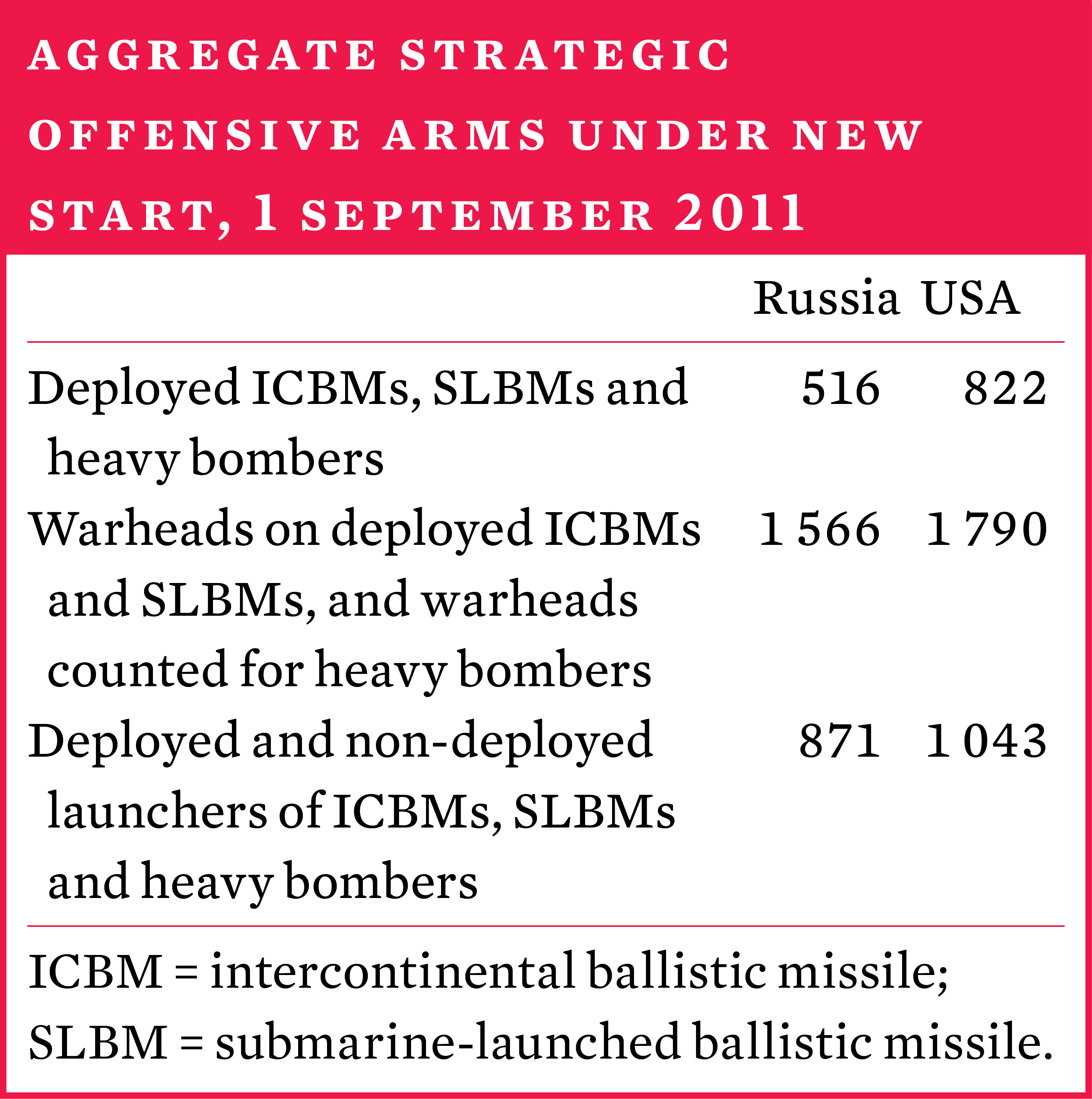8. Nuclear arms control and non-proliferation
Overview, Shannon N. Kile [PDF]
I. Russian–US nuclear arms control, Shannon N. Kile [PDF]
II. Syria and nuclear proliferation concerns, Shannon N. Kile [PDF]
III. Iran and nuclear proliferation concerns, Shannon N. Kile [PDF]
IV. North Korea’s nuclear programme, Shannon N. Kile [PDF]
V. Developments in the Nuclear Suppliers Group, Sibylle Bauer [PDF]
VI. International cooperation on non-proliferation, arms control and nuclear security, Shannon N. Kile [PDF]
Russian–US nuclear arms control
The momentum behind treaty-based approaches to nuclear arms control and disarmament was highlighted in 2011 by the entry into force of the 2010 Russia–USA Treaty on Measures for the Further Reduction and Limitation of Strategic Offensive Arms (New START), which mandated additional reductions in the two parties’ strategic offensive nuclear forces.
The parties implemented on schedule the inspections, data exchanges, notifications and other measures set out in the treaty’s cooperative monitoring and verification regime. In establishing this regime—one of the treaty’s main achievements—New START continued an arms control process through which Russia and the USA have redefined their strategic relationship.
There were questions about the next steps in Russian–US arms control. Both sides acknowledged that making further cuts in their nuclear arsenals would require expanding the bilateral agenda to address tactical nuclear weapons and non-deployed warheads as well as broader strategic stability issues. The most prominent of the latter related to ballistic missile defence, which was the focus of an intensifying dispute in 2011. There was also recognition that deeper cuts in their respective strategic nuclear arsenals would require bringing the three other nuclear weapon states recognized by the 1968 Non-Proliferation Treaty (NPT) into a multilateral nuclear arms-reduction process.
Nuclear proliferation concerns in Iran and Syria
International efforts to prevent the spread of nuclear weapons remained a top priority in 2011. Two states—Iran and Syria—came under intensified scrutiny during the year for allegedly concealing military nuclear activities, in contravention of their commitments under the NPT.
A three-year investigation by the International Atomic Energy Agency (IAEA) concluded that a building in Syria destroyed by an Israeli air strike in 2007 was ‘very likely’ to have been a nuclear reactor that should have been declared to the agency. The IAEA also reported that it had credible evidence that Iran had pursued nuclear weapon-related activities in the past and said that some of the activities might still be continuing. The difficulties encountered by inspectors in both countries led to renewed calls to expand the IAEA’s legal powers to investigate NPT states parties suspected of violating their treaty-mandated safeguards agreements, even beyond those set out in the Model Additional Protocol.
The unresolved Iranian and Syrian nuclear controversies raised further doubt about the efficacy of international legal approaches, in particular the role of the UN Security Council, in dealing with suspected or known cases of states violating important arms control treaty obligations and norms. During 2011 Iran continued to defy five Security Council resolutions, adopted since 2006, demanding that it suspend all uranium enrichment and other sensitive nuclear fuel cycle activities. A divided Security Council failed to take action on Syria’s nuclear file after the IAEA Board of Governors had declared the country to be non-compliant with its safeguards agreement. In the view of some observers, the lack of action set the stage for future controversies about the suitability of extra-legal measures, including the pre-emptive use of military force, in addressing proliferation concerns.
North Korea’s nuclear programme
The diplomatic impasse over the fate of the nuclear programme of North Korea remained unresolved in 2011. Preliminary discussions aimed at restarting the suspended Six-Party Talks on the denuclearization of North Korea made little progress, despite renewed contacts between North Korean and US diplomats. The legal and normative challenges posed by North Korea to the global non-proliferation regime were underscored by reports that the country had been involved in covert transfers of nuclear and ballistic technologies to third countries on a larger scale than previously suspected.
Developments in the Nuclear Suppliers Group
In June 2011 the Nuclear Suppliers Group (NSG) reached a controversial consensus agreement to tighten its transfer guidelines for uranium-enrichment and plutonium-reprocessing (ENR) equipment and technology. The NSG states could not agree on language for the imposition of certain subjective criteria; instead, they settled on conditioning the transfer of nuclear technology on signing an additional safeguards protocol with the IAEA and on the importing state being in full compliance with its IAEA obligations.
An issue at the very heart of nuclear non-proliferation is the relationship between the NSG suppliers and those states with nuclear weapons that are outside of the framework of the NPT and the NSG. The 2011 NSG plenary discussed whether the revised guidelines affected India’s eligibility to receive ENR transfers and its possible membership of the NSG.
Cooperation on non-proliferation, arms control and nuclear security
The risks of nuclear terrorism and the illicit diversion of nuclear materials continued to be the focus of high-level political attention around the globe in 2011.
The Group of Eight (G8) agreed to extend the 2002 Global Partnership against the Spread of Weapons and Materials of Mass Destruction—an initiative which has supported cooperative projects aimed at addressing non-proliferation, disarmament and nuclear security issues. In addition, the UN Security Council adopted Resolution 1977, which extended by 10 years the mandate of the committee established under Resolution 1540 to monitor and facilitate states’ compliance with their obligations under the resolution.
